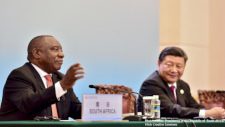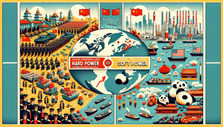Changing Southeast Asia: The Role of China, the United States, Japan and ASEAN
Cao Yunhua
Southeast Asia’s international perspective has been changing sharply in the twenty-first century. A multipolar structure has emerged, in which China, the U.S. and Japan work together with ASEAN to maintain peace, stability and prosperity in the region. Success in this endeavor depends largely on ASEAN’s influence and role. ASEAN understands China’s influence in the Southeast Asia is rising, while the U.S. is a “moderate superpower”; therefore, it is necessary to expand the impact and presence of the U.S. and Japan in order to counterbalance China. Despite China’s rise and the changing political landscape in Southeast Asia, the U.S. will continue to play an important role in the region.
Related Publications
-
ISDP Annual Report 2023
ISDP’s Annual Report for the year 2023. We look back on 2023, a year in which tensions and conflicts captured the strategic space in ISDP’s focus areas, making headlines around […]
-
China’s Security Engagement with Africa & The “Global South” Narrative
In recent decades, China has actively sought to position itself as a pivotal partner and emerging leader within the Global South. Despite the lack of clear consensus on the definition […]
-
The US and EU, and the Emerging Supply Chain Network: Politics, Prospects, and Allies
The Global Supply Chains have evolved from simply logistical achievements to being the bedrock of the global economy. Driven by technological advances and geopolitical shifts, this transformation underscores the critical […]
-
Navigating the Indo-Pacific: How Australia and the EU Can Partner for Peace, Stability, and Prosperity
To navigate the choppy waters of the Indo-Pacific, the EU and Australia must be on the same wavelength regarding shared interests in rules, values, and an open and liberal economic […]
-
Hegemony at a Crossroads: The Inverse Dynamics of China’s Global Strategy
Here is my bold statement. Hard power projection decimates soft power but only for authoritarian states. In the early 21st century, I was living in Beijing and at that time […]




